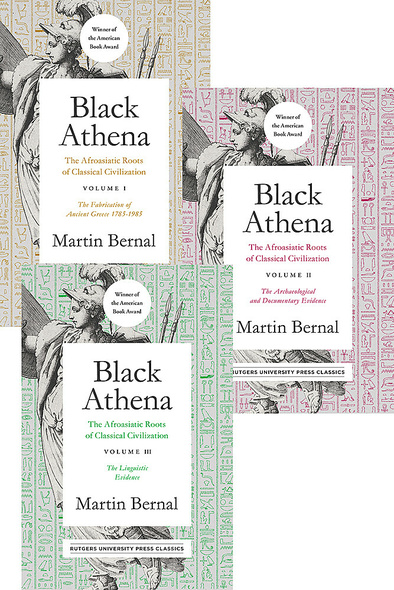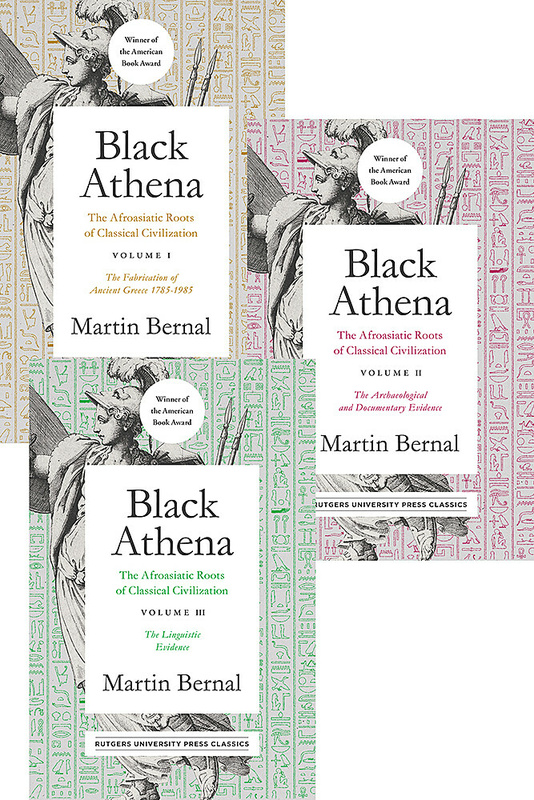Black Athena (3 vol set)
The Afroasiatic Roots of Classical Civilization
Winner of the 1990 American Book Award
What is classical about Classical civilization? In one of the most audacious works of scholarship ever written, Martin Bernal challenges the foundation of our thinking about this question. Classical civilization, he argues, has deep roots in Afroasiatic cultures. But these Afroasiatic influences have been systematically ignored, denied or suppressed since the eighteenth century—chiefly for racist reasons.
The popular view is that Greek civilization was the result of the conquest of a sophisticated but weak native population by vigorous Indo-European speakers—Aryans—from the North. But the Classical Greeks, Bernal argues, knew nothing of this “Aryan model.” They did not see their institutions as original, but as derived from the East and from Egypt in particular.
In an unprecedented tour de force, Bernal links a wide range of areas and disciplines—drama, poetry, myth, theological controversy, esoteric religion, philosophy, biography, language, historical narrative, and the emergence of “modern scholarship.”
This is a complete set of all three volumes, shrink-wrapped.
A monumental and path-breaking work.'
Black Athena is a powerfully written and brilliantly researched book that relentlessly unveils the historical and cultural African origins of Western civilization. Still a must read for all those in search of truth.'
Martin Bernal’s Black Athena is nothing short of a monumental achievement in scholarship that re-oriented and transformed serious study of ancient civilizations. It remains a soaring accomplishment of classical erudition of the Afroasiatic foundation of Greek history.'
In a spectacular undertaking, Martin Bernal sets out to... restore the credibility of what he calls the Ancient Model of the beginnings of Greek civilizations... Bernal makes an exotic interloper in Classical studies. He comes to them with two outstanding gifts: a remarkable flair for the sociology - perhaps one should say politics - of knowledge, and a formidable linguistic proficiency... The story told by Bernal, with many fascinating twists and turns and quite a few entertaining digressions, is... a critical inquiry into a large part of the European imagination... a retrospect of ingenious and often sardonic erudition.'
A work which has much to offer the lay reader, and its multi-disciplinary sweep is refreshing: it is an important contribution to historiography and the sociology of knowledge, written with elegance, wit, and self-awareness... a thrilling journey... his account is as gripping a tale of scholarly detection and discovery as one could hope to find.'
Bernal's material is fascinating, his mind is sharp, and his analyses convince.'
A formidable work of intellectual history, one that demonstrates that the politics of knowledge is never far from national politics.'
An astonishing work, breathtakingly bold in conception and passionately written... salutary, exciting, and, in its historiographical aspects, convincing.'
Bernal's work and the stir it has occasioned have caused ancient historians and archaeologists to undertake a major reexamination of methods and motives.'
His book should be welcome to both classicists and ancient historians, most of whom will, now at least, be inclined to agree with him.'
Colossal.... Bernal aims to revise current understanding of Ancient Middle Eastern history by taking seriously the ancient Greeks' legends that portrayed much in their civilization as originating in the Middle East, especially Egypt.'
[Bernal's] multifaceted assault on academic complacency is an important contribution to the development of a more open, historical, and culturally oriented post-processual archaeology.'
A breathtaking panoply of archaeological artifacts, texts, and myths.'
Challenges the racism implicit in the recent 'cultural literacy' movement.'
[Martin Bernal] has forced scholars to reexamine the roots of Western civilization.'
Martin Bernal has managed to make the subject of Ancient Greece both popular and controversial.'
Demands to be taken seriously... Every page that Bernal writes is educating and enthralling. To agree with all his thesis may be a sign of naivety, but not to have spent time in his company is a sign of nothing at all.'
A serious work that deals in a serious way with many of the principal issues of Aegean history in the second millennium B.C., and one can ask little more of any historical work.'






